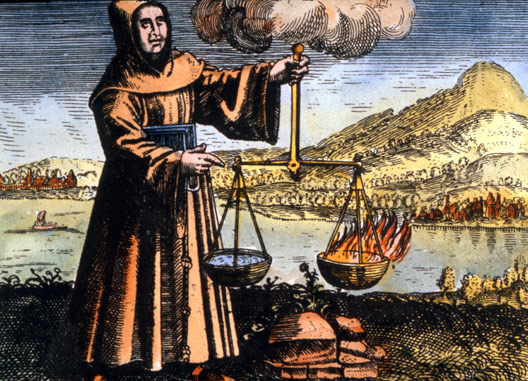Fr : version française / En: english version
Alchemy
Experimenting with the effects of fire is an age-old practice. In the Middle Ages and modern times, alchemists play an important role in exploring fire's transformative properties. A full-fledged philosophy of nature, this ancient form of chemistry— which it branched off from in the 18th century—is admittedly a long way from modern chemistry. Based like the medicine of the time on the principle that the world is an organic whole, alchemy nonetheless involves real laboratory work. Using analogical reasoning and supposed correspondences between the various elements, alchemists continually transform matter, especially metals, in the belief that metals derive their properties from the original qualities of base elements' fundamental principles. Heating, burning, dissolving—unlike the magical practice often attributed to them, alchemy experimenters carry out genuine laboratory experiments.
The philosophic fire
...so that Fire & Water seem to have interchanged their mutual qualities, or else the philosophic fire is not to be supposed of the same kind with the common Fire; and the same thing is to be said of the Philosophic water.
As for the Calc Vive or Quicklime & Ignis Graecus, we know that they are kindled by Water and cannot be extinguished by it contrary to the Nature of other things that will take Fire; so it is affirmed that Camphor over-kindled will burn in Water. And Anselm de Bood says that the Stone Gagates being set on fire is more easily quenched by Oil than Water, for Oil will mingle with it and choke the fiery body. Whereas Water not being able to mix with the fatness yields to the fire unless it totally covers & overwhelms it, which it cannot easily do because although it be a Stone, it swims upon the top of the Water like Oil, so Naphtha, Petroleum and the like are not easily quenched by Water. (...).
There is therefore great diversity in Fires, both in their being kindled and extinguished, & there is no less in Liquors, for Milk, Vinegars, Spirits of Wine, aqua fortis, aqua Regia and Common Water differ very much when they are thrown upon Fire.
Excerpt from "Atalanta Fugiens" by Michael Maier
This alchemist monk is "balancing the elements," that is, weighing matter in fire. In addition to food, fire's calorific power can cook matter, or transform its molecular structure to enhance its physical properties.





























